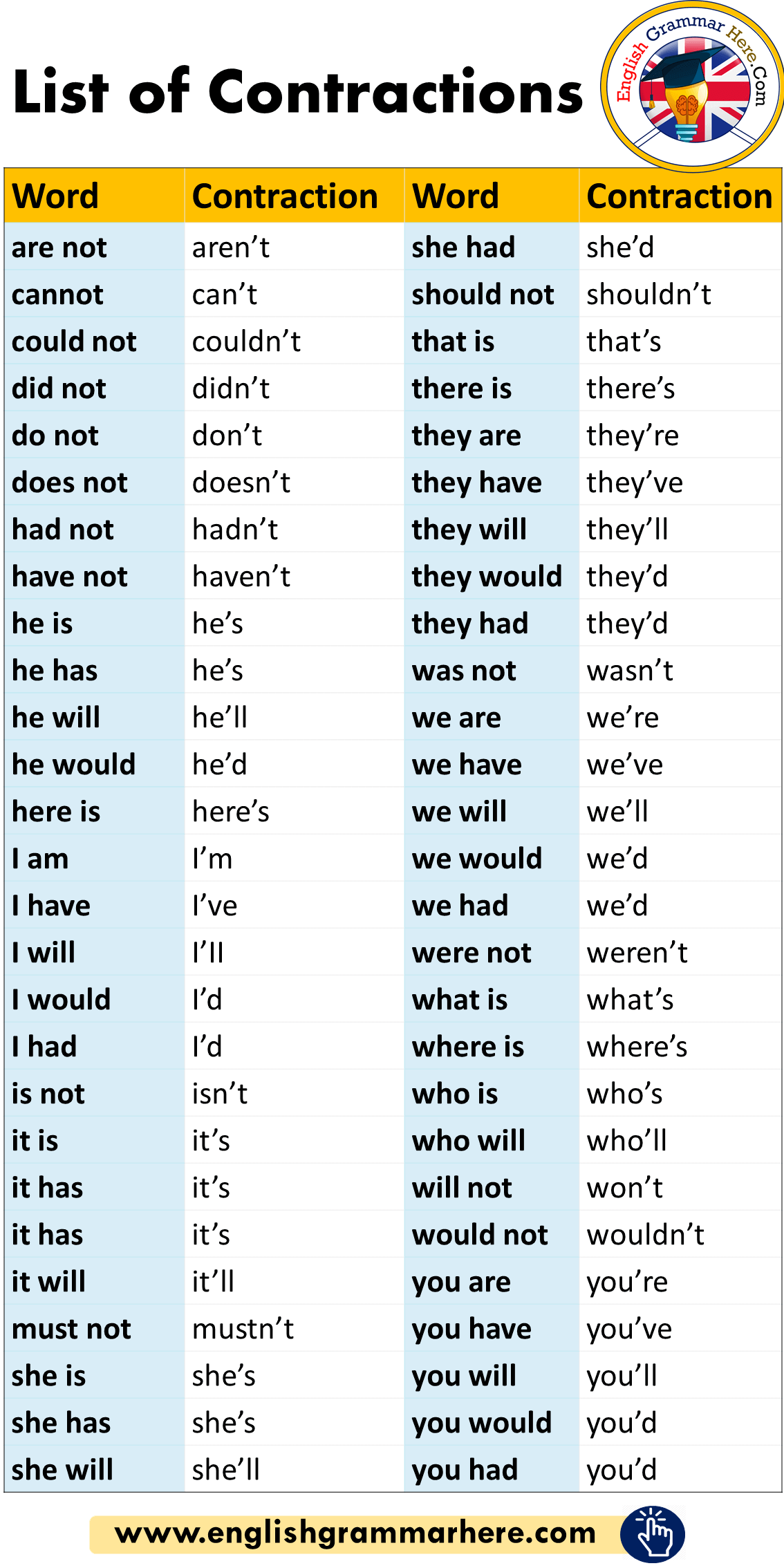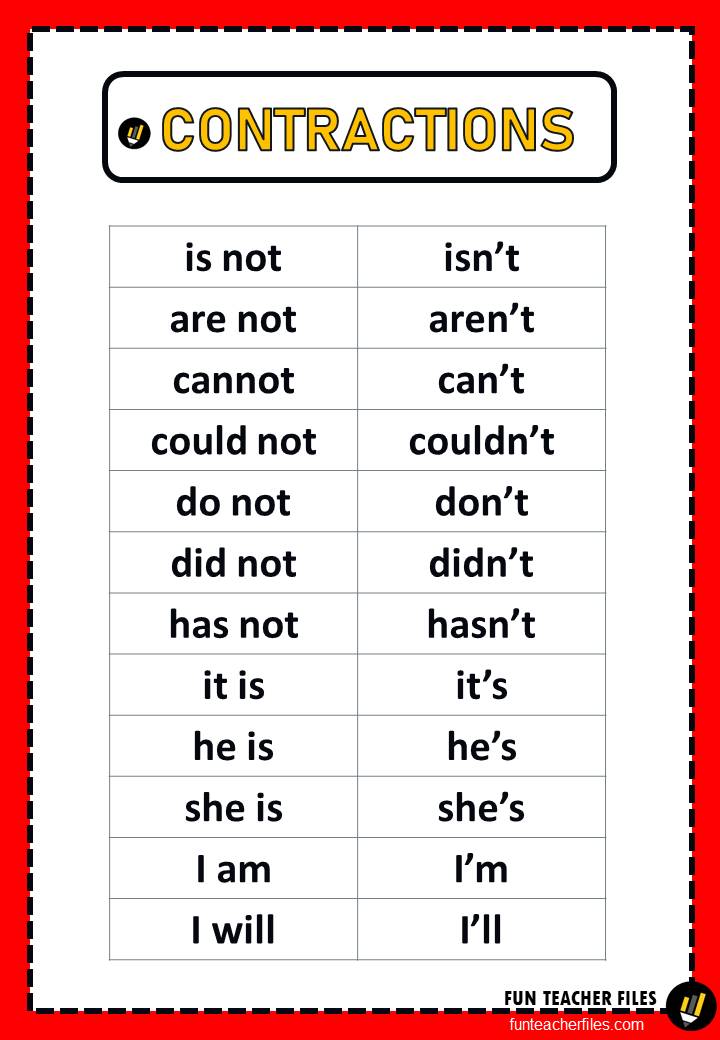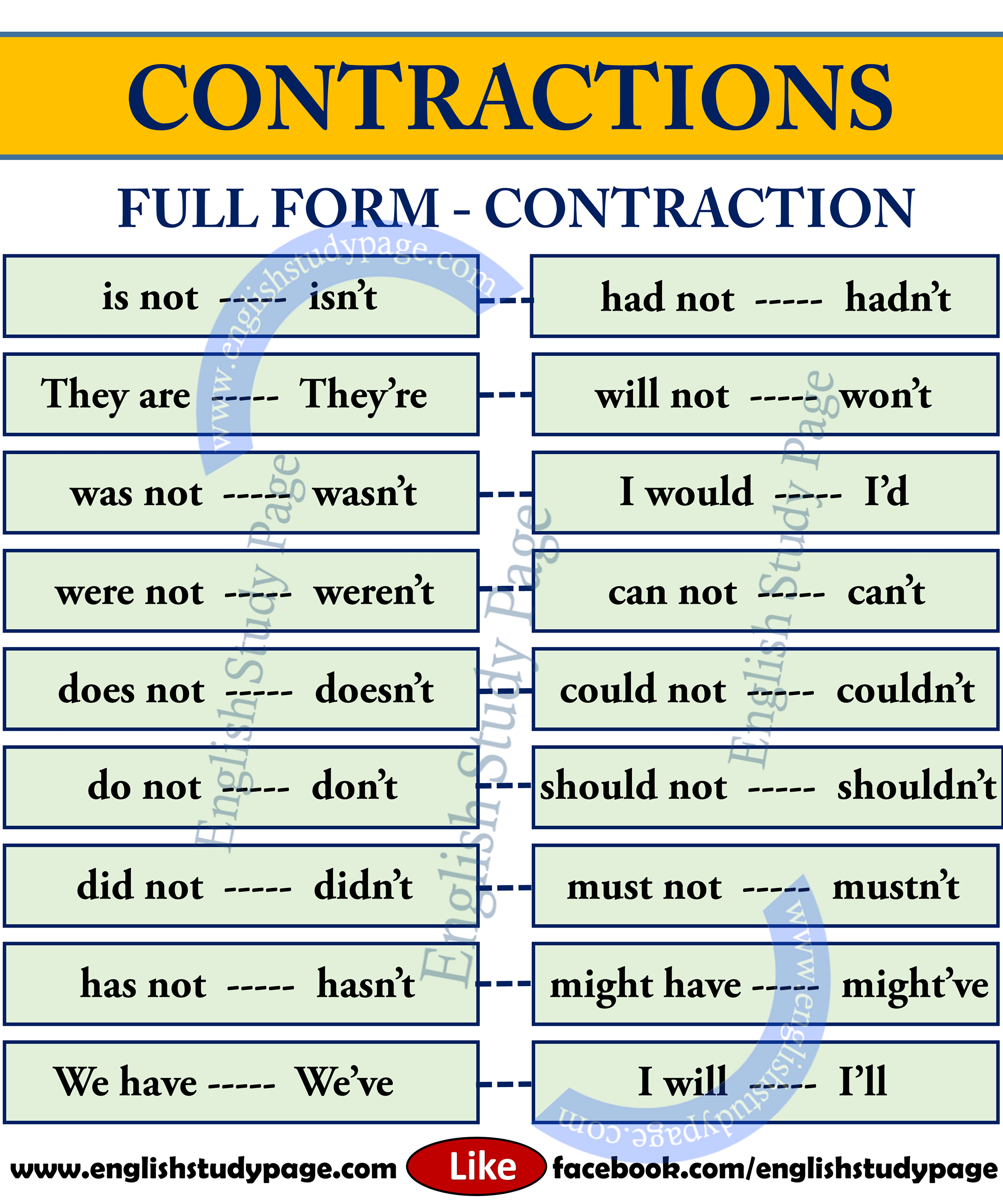Would Not Contracted Form
Would Not Contracted Form - We seldom use short/contracted forms after names and nouns. The short/contracted forms 's and 'd have have two different long forms: We use contractions (i’m, we’re) in everyday speech and informal writing. Contractions, which are sometimes called ‘short forms’, commonly. Most contractions in english are pretty straightforward: He would is shortened to he’d;
We seldom use short/contracted forms after names and nouns. He would is shortened to he’d; The short/contracted forms 's and 'd have have two different long forms: Most contractions in english are pretty straightforward: Contractions, which are sometimes called ‘short forms’, commonly. We use contractions (i’m, we’re) in everyday speech and informal writing.
Contractions, which are sometimes called ‘short forms’, commonly. Most contractions in english are pretty straightforward: He would is shortened to he’d; We use contractions (i’m, we’re) in everyday speech and informal writing. The short/contracted forms 's and 'd have have two different long forms: We seldom use short/contracted forms after names and nouns.
Contracted negative forms of auxiliary verbs Contractions in English
We seldom use short/contracted forms after names and nouns. Contractions, which are sometimes called ‘short forms’, commonly. The short/contracted forms 's and 'd have have two different long forms: He would is shortened to he’d; Most contractions in english are pretty straightforward:
It’s Okay to Use Contractions ENG4U Kevin Streight
Most contractions in english are pretty straightforward: The short/contracted forms 's and 'd have have two different long forms: Contractions, which are sometimes called ‘short forms’, commonly. We use contractions (i’m, we’re) in everyday speech and informal writing. We seldom use short/contracted forms after names and nouns.
Contractions Chart in English Grammar Fun Teacher Files
We use contractions (i’m, we’re) in everyday speech and informal writing. The short/contracted forms 's and 'd have have two different long forms: We seldom use short/contracted forms after names and nouns. He would is shortened to he’d; Contractions, which are sometimes called ‘short forms’, commonly.
List of Contractions Contraction Words Used in Writing and Speaking
We use contractions (i’m, we’re) in everyday speech and informal writing. Most contractions in english are pretty straightforward: Contractions, which are sometimes called ‘short forms’, commonly. The short/contracted forms 's and 'd have have two different long forms: He would is shortened to he’d;
+150 Contracted Forms of Verbs (Simple Guide) TPR Teaching
Most contractions in english are pretty straightforward: Contractions, which are sometimes called ‘short forms’, commonly. He would is shortened to he’d; We use contractions (i’m, we’re) in everyday speech and informal writing. We seldom use short/contracted forms after names and nouns.
+150 Contracted Forms of Verbs (Simple Guide) TPR Teaching
Most contractions in english are pretty straightforward: He would is shortened to he’d; Contractions, which are sometimes called ‘short forms’, commonly. We use contractions (i’m, we’re) in everyday speech and informal writing. The short/contracted forms 's and 'd have have two different long forms:
Pin on Contractions
We use contractions (i’m, we’re) in everyday speech and informal writing. The short/contracted forms 's and 'd have have two different long forms: He would is shortened to he’d; We seldom use short/contracted forms after names and nouns. Most contractions in english are pretty straightforward:
List of Contractions in English English Study Page
We seldom use short/contracted forms after names and nouns. The short/contracted forms 's and 'd have have two different long forms: Contractions, which are sometimes called ‘short forms’, commonly. We use contractions (i’m, we’re) in everyday speech and informal writing. Most contractions in english are pretty straightforward:
Contractions 70+ Contractions in English Contraction Words
He would is shortened to he’d; Contractions, which are sometimes called ‘short forms’, commonly. The short/contracted forms 's and 'd have have two different long forms: We use contractions (i’m, we’re) in everyday speech and informal writing. We seldom use short/contracted forms after names and nouns.
Detailed Contractions List in English English Grammar Here English
The short/contracted forms 's and 'd have have two different long forms: He would is shortened to he’d; We seldom use short/contracted forms after names and nouns. Most contractions in english are pretty straightforward: Contractions, which are sometimes called ‘short forms’, commonly.
The Short/Contracted Forms 'S And 'D Have Have Two Different Long Forms:
We seldom use short/contracted forms after names and nouns. We use contractions (i’m, we’re) in everyday speech and informal writing. Contractions, which are sometimes called ‘short forms’, commonly. Most contractions in english are pretty straightforward:









